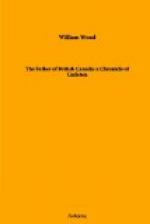The Indians were also an object of special solicitude in the royal proclamation. ’The Indians who live under our Protection should not be molested in the possession of such parts of our Dominions and Territories as, not having been ceded to or purchased by Us, are reserved to them.’ The home government was far in advance of the American colonists in its humane attitude towards the Indians. The common American attitude then and long afterwards —indeed, up to a time well within living memory—was that Indians were a kind of human vermin to be exterminated without mercy, unless, of course, more money was to be made out of them alive. The result was an endless struggle along the ever-receding frontier of the West. And just at this particular time the ‘Conspiracy of Pontiac’ had brought about something like a real war. The story of this great effort of the Indians to stem the encroachments of the exterminating colonists is told in another chronicle of the present Series. [Footnote: The War Chief of the Ottawas.] The French traders in the West undoubtedly had a hand in stirring up the Indians. Pontiac, a sort of Indian Napoleon, was undoubtedly cruel as well as crafty. And the Indians undoubtedly fought just as the ancestors of the French and British used to fight when they were at the corresponding stage of social evolution. But the mere fact that so many jealously distinct tribes united in this common cause proves how much they all must have suffered at the hands of the colonists.
While Pontiac’s war continued in the West Murray had to deal with a political war in Canada which rose to its height in 1764. The king’s proclamation of the previous October had ’given express Power to our Governor that, so soon as the state and circumstances of the said Colony will admit thereof, he shall call a General Assembly in such manner and form as is used in those Colonies and Provinces in America which are under our immediate government.’ The intention of establishing parliamentary institutions was, therefore, perfectly clear. But it was equally clear that the introduction of such institutions was to depend on ‘circumstances,’ and it is well to remember here that these ‘circumstances’ were not held to warrant the opening of a Canadian parliament till 1792. Now, the military government had been a great success. There was every reason to suppose that civil government by a governor and council would be the next best thing. And it was quite certain that calling a ‘General Assembly’ at once would defeat the very ends which such bodies are designed to serve. More than ninety-nine per cent of the population were dead against an assembly which none of them understood and all distrusted. On the other hand, the clamorous minority of less than one per cent were in favour only of a parliament from which the majority should be rigorously excluded, even, if possible, as voters. The immense majority comprised the entire French-Canadian community.




